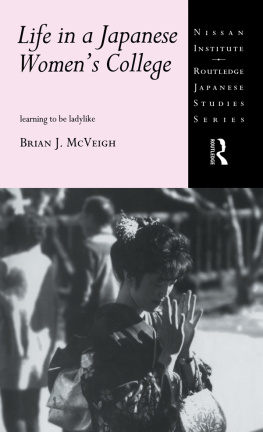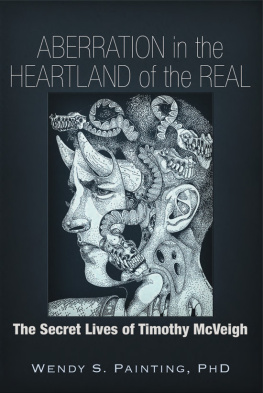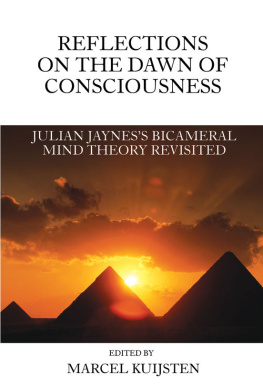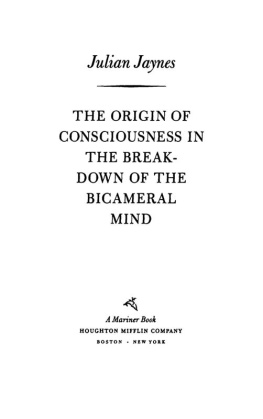McVeigh - The Other Psychology of Julian Jaynes
Here you can read online McVeigh - The Other Psychology of Julian Jaynes full text of the book (entire story) in english for free. Download pdf and epub, get meaning, cover and reviews about this ebook. year: 2018, publisher: Imprint Academic, genre: Art. Description of the work, (preface) as well as reviews are available. Best literature library LitArk.com created for fans of good reading and offers a wide selection of genres:
Romance novel
Science fiction
Adventure
Detective
Science
History
Home and family
Prose
Art
Politics
Computer
Non-fiction
Religion
Business
Children
Humor
Choose a favorite category and find really read worthwhile books. Enjoy immersion in the world of imagination, feel the emotions of the characters or learn something new for yourself, make an fascinating discovery.

The Other Psychology of Julian Jaynes: summary, description and annotation
We offer to read an annotation, description, summary or preface (depends on what the author of the book "The Other Psychology of Julian Jaynes" wrote himself). If you haven't found the necessary information about the book — write in the comments, we will try to find it.
McVeigh: author's other books
Who wrote The Other Psychology of Julian Jaynes? Find out the surname, the name of the author of the book and a list of all author's works by series.
The Other Psychology of Julian Jaynes — read online for free the complete book (whole text) full work
Below is the text of the book, divided by pages. System saving the place of the last page read, allows you to conveniently read the book "The Other Psychology of Julian Jaynes" online for free, without having to search again every time where you left off. Put a bookmark, and you can go to the page where you finished reading at any time.
Font size:
Interval:
Bookmark:
The Other Psychology of Julian Jaynes
Ancient Languages, Sacred Visions, and Forgotten Mentalities
Brian J. McVeigh
imprint-academic.com
2018 digital version converted and published by
Andrews UK Limited
www.andrewsuk.com
Copyright Brian J. McVeigh, 2018
The moral rights of the authors have been asserted. No part of this publication may be reproduced in any form without permission, except for the quotation of brief passages in criticism and discussion.
Imprint Academic, PO Box 200, Exeter EX5 5YX, UK
Acknowledgments
I would like to thank Rabbi James Cohn, Marcel Kuijsten, Michael Carr, Yu-Hui Chen, Bill Rowe, Scott Greer, Carole Brooks Platt, John Hainly, William Woodward, Yeufen Hsieh, Todd Gibson, and Barbara Greene for their advice and helpful comments. As always, my wife and family have been a source of support, comfort, and inspiration.
The germ for Chapter 6 was a graduate school paper entitled Auditory Verbal Hallucinations and Right Hemispheric Activity: Evidence and Implications. I am grateful to Prof. Donald Graves (Sage Graduate School) for offering invaluable advice.
Notes to the Reader and Abbreviations
Though Jaynes used consciousness in his writings, this term is vague, multi-referential, and misleading; in English consciousness has at least four very different meanings: (1) the physiological state of not sleeping; (2) the physiological state of not being in a coma; (3) a vague usage to describe some form of cognition, thinking, perception, or awareness; and (4) what ones inner self introspects upon. For the sake of clarity I prefer conscious interiority, though throughout this book I will use consciousness and conscious interiority interchangeably; both refer to Jayness particular understanding of consciousness (note that the Psychologist John Limber coined J-coni.e. Jaynesian consciousnessto avoid confusion [2006]).
As much as possible I have attempted to present my arguments without cluttering the text with tables and charts, though to some degree this is unavoidable. Statistical analyses are placed in appendices, as are the corresponding datasets upon which the analyses are based. In order to make the hypotheses understandable while at the same time referencing relevant data and statistical evidence, I use six types of figures: (1) Charts offering basic facts; (2) Tables presenting numerical data; (3) App Calculations in appendices displaying statistical analyses and are referred to in chapters; (4) Hypothesis Logs summarizing research findings; (5) Datasets in appendices providing raw numbers; and (6) Graphs that visually quantify numerical values.
One final note: I distinguish between the academic discipline of Psychology (with a capitalized P) and the psychological (with a small p) or what since the late nineteenth century has been called mind or emotional, perceptive, and cognitive processes.
Abbreviations
ADC: Auxiliary Divine Communication
AIMP: As If Mortuary Practices
ARCC: Authority-Radiating Ceremonial Complexes
AVH: Auditory Verbal Hallucination
BA: Bronze Age
BCI Hypothesis: Bicameral Civilization Inventory Hypothesis
CAW: Centrality of Ancestor Worship
CG: Complex Graph
Chi-Sq G of F: Chi-Square Goodness of Fit
df: Degrees of Freedom
EmPL: Embryonic Psycholexicon
ePSD: Electronic Pennsylvania Sumerian Dictionary
ES: Effect Size
ETCSL: Electronic Text Corpus of Sumerian Literature
EV: Emotional Valence
HG: Hittite Grammar
IB: Intermediary Beings
IMRHA: Induction Methods for Right-Hemisphere Activation
LRCUTA: Linguistics Research CenterUniversity of Texas
MW: MindWord
NE: Negative Emotion
OHF: Objects of Hallucinatory Focus
PBCI Hypothesis: Postbicameral Civilization Inventory Hypothesis
PE: Positive Emotion
PL: Psycholexicon (Psychological Lexicon)
PS: Pictophonetic; Signific
RHD: Right-Hemisphere Dominance
RL: Religious Lexicon
SV: Supernatural Visitations
The Origin : The Origin of Consciousness in the Breakdown of the Bicameral Mind (book by Julian Jaynes published in 1976)
TSO: Theocentric Social Order
VB: Vestigial Bicameralism (after ca. 1000 BCE)
VV: VoiceVolition
Introduction: The Need for a Cultural-Historical Psychology
Could it be that silent speech areas on the right hemisphere had some function at an earlier stage in mans history that now they do not have?
Julian Jaynes
When I was a high school student my mother, always interested in anything off the beaten track, gave me a copy of The Origin of Consciousness in the Breakdown of the Bicameral Mind (1976) (henceforth The Origin ) in which Julian Jaynes (19201997) argued that before approximately 1200 BCE people possessed a different mentality. Boldly interdisciplinary and iconoclastic, Jaynes marshaled evidence from neuroscience, Psychology, archeology, history, linguistics, and the analysis of ancient texts. What Jaynes had to say about the duplex nature of the psyche resonated with something my mother used to say to me when as a young boy I would grumble about not being able to accomplish some difficult task: Stop your complaining. If your brain hears you saying you cant do something, it will believe you. The mind, I concluded, is not unitary despite the strange illusion that it is. This piqued my interest in how the mind is put together. However, it was my older brother, Billy, who also has something to do with how my interests in the human mind developed. Diagnosed with autism from a very early age, Billy had an angelic countenance, was ordinarily shy, and hardly spoke. When he did, what he had to say was done in a telegraphic, soft-spoken, and gentle manner. But occasionally Billy would erupt, volcano-like, in extremely violent psychomotor seizures. These were ferocious but fortunately brief. Accompanying these attacks were guttural shouts, fearsome grunts, murderous threats, and language so foul and vile we could only wonder from where he had acquired such a formidable linguistic arsenal. It was as if an angry demon resided somewhere in his person. Surely, I thought, the individual psyche must be composed of different parts that, while perhaps ordinarily integrated, manifest themselves under the right conditions as independent entities.
Critically acclaimed but controversial, The Origin was far ahead of its time. Now Jayness theories are increasingly gaining traction in a number of fields. With his unconventional theories that consciousness only emerged three thousand years ago and of the role of hallucinations in history, he relied heavily on extra-laboratory, non-experimental research to demonstrate how consciousness rests upon strata of accumulated ideas, i.e. consciousness is socially scaffolded through layers of time. He has been described as a maverickI once asked a graduate student in Princeton Universitys Psychology Department what Jayness colleagues thought of him: a well-regarded kook was the answer. However, if viewed objectively against the backdrop of the history of Psychology and the original promise of this field, his approach is actually not that unusual. One may question his startling conclusions, but his premise that cultural and historical studies are indispensable for understanding psyche was not a foreign concept to the pioneers and founders of what would become modern Psychology. The likes of Wilhelm Wundt (18321920), William James (18421910), and Pierre Janet (18591947) all recognized the saliency and significance of long-term temporal changes, customs, religion, and anomalous behavior (e.g. hypnosis and trance). Indeed, an irony of intellectual history is how Wundt, though often regarded as the originator of experimental-laboratory Psychology, considered his ten-volume work on ethnocultural Psychology ( Vlkerpsychologie , 19001920) to be his more important, signature contribution.
Next pageFont size:
Interval:
Bookmark:
Similar books «The Other Psychology of Julian Jaynes»
Look at similar books to The Other Psychology of Julian Jaynes. We have selected literature similar in name and meaning in the hope of providing readers with more options to find new, interesting, not yet read works.
Discussion, reviews of the book The Other Psychology of Julian Jaynes and just readers' own opinions. Leave your comments, write what you think about the work, its meaning or the main characters. Specify what exactly you liked and what you didn't like, and why you think so.











